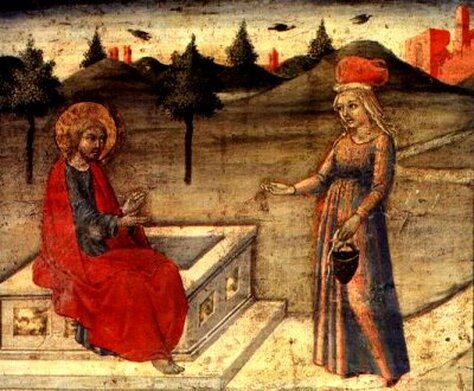John 4:1-26
Lesson 170
Lesson 170
Read both the "King James Bible" and the "New Living Translation."
In this lesson:
Jesus on salvation and the nature of true worship.
Salvation is for everyone, Jew and Gentile.
Jesus on salvation and the nature of true worship.
Salvation is for everyone, Jew and Gentile.
Jesus and the Samaritan woman at the well.
Study Tip:
Does this passage warn us of something to avoid?
Does it teach a commandment to follow?
What difference can this passage make in your life?
Does this passage warn us of something to avoid?
Does it teach a commandment to follow?
What difference can this passage make in your life?
Who was -
Jacob -
Also called Israel. With his twin brother Esau, Jacob was the son of Isaac and Rebekah and Abraham's grandson. Jews consider him the father of the twelve tribes of Israel. Jacob, his father Isaac, and grandfather Abraham are three of the Old Testament's most important figures. God chose Jacob over his older brother Esau to fulfill His promise to make Israel a great and populous nation (Genesis 48:1-22). With his mother's help, Jacob conned his older twin brother Esau out of his father's blessing and birthright (Genesis 25:27-34; Genesis 27:1-45). This included the land of Canaan promised to Jacob's father Isaac and grandfather Abraham. Esau vowed to kill Jacob for his trickery (Genesis 27:41), forcing Jacob to flee to his Uncle Laban in Haran. On his way, he had a vision of climbing a ladder ("Jacob's ladder")
to heaven. When he reached the top, God repeated the promise He made to Isaac and Abraham (Genesis 28:12-14). Jacob and Esau eventually reconciled. Jacob became such a shining example of faith that even when near death, he trusted God's promise to make Israel a great nation (Hebrews 11:21-22). Jacob died at the age of one hundred and forty-seven (Genesis 47:28). In time, Moses led Jacob's descendants out of slavery in Egypt. Forty years later, Joshua led them into the promised land, thus fulfilling God's promise. The twelve tribes of Israel are named after Jacob's sons. It was Jacob's son, Joseph, who was sold into bondage by his brothers. You can learn more about Jacob in Genesis 25:1-37:36.
Joseph -
One of Jacob's sons with Rachel born in Haran. As a youngster, Joseph was prideful, overconfident, boastful, his father's favorite son, and the apparent heir to the family birthright. This riled Joseph's brothers, so to be rid of him, they sold him into bondage (Genesis 37). Joseph became a slave in Egypt, but due to his leadership skills and the ability to interpret dreams, he found favor with Pharaoh and became a high-ranking Egyptian official. Joseph forgave his brothers, fed them during a famine, and had his family brought to Egypt to live with him. Joseph never forgot God's promise to his
great grandfather Abraham to make Israel a great nation and is an example of faith and perseverance in the face of temptation and adversity. His faith led him to trust God's promise even as he lay dying (Genesis 50:24-25). Joseph died at the age of 110 (Genesis 50:22). Four hundred years after his death, Moses carried Joseph's bones to be buried in the promised land (Exodus 13:19; Joshua 24:32). You can learn more about Joseph in Genesis 30-50.
Jacob -
Also called Israel. With his twin brother Esau, Jacob was the son of Isaac and Rebekah and Abraham's grandson. Jews consider him the father of the twelve tribes of Israel. Jacob, his father Isaac, and grandfather Abraham are three of the Old Testament's most important figures. God chose Jacob over his older brother Esau to fulfill His promise to make Israel a great and populous nation (Genesis 48:1-22). With his mother's help, Jacob conned his older twin brother Esau out of his father's blessing and birthright (Genesis 25:27-34; Genesis 27:1-45). This included the land of Canaan promised to Jacob's father Isaac and grandfather Abraham. Esau vowed to kill Jacob for his trickery (Genesis 27:41), forcing Jacob to flee to his Uncle Laban in Haran. On his way, he had a vision of climbing a ladder ("Jacob's ladder")
to heaven. When he reached the top, God repeated the promise He made to Isaac and Abraham (Genesis 28:12-14). Jacob and Esau eventually reconciled. Jacob became such a shining example of faith that even when near death, he trusted God's promise to make Israel a great nation (Hebrews 11:21-22). Jacob died at the age of one hundred and forty-seven (Genesis 47:28). In time, Moses led Jacob's descendants out of slavery in Egypt. Forty years later, Joshua led them into the promised land, thus fulfilling God's promise. The twelve tribes of Israel are named after Jacob's sons. It was Jacob's son, Joseph, who was sold into bondage by his brothers. You can learn more about Jacob in Genesis 25:1-37:36.
Joseph -
One of Jacob's sons with Rachel born in Haran. As a youngster, Joseph was prideful, overconfident, boastful, his father's favorite son, and the apparent heir to the family birthright. This riled Joseph's brothers, so to be rid of him, they sold him into bondage (Genesis 37). Joseph became a slave in Egypt, but due to his leadership skills and the ability to interpret dreams, he found favor with Pharaoh and became a high-ranking Egyptian official. Joseph forgave his brothers, fed them during a famine, and had his family brought to Egypt to live with him. Joseph never forgot God's promise to his
great grandfather Abraham to make Israel a great nation and is an example of faith and perseverance in the face of temptation and adversity. His faith led him to trust God's promise even as he lay dying (Genesis 50:24-25). Joseph died at the age of 110 (Genesis 50:22). Four hundred years after his death, Moses carried Joseph's bones to be buried in the promised land (Exodus 13:19; Joshua 24:32). You can learn more about Joseph in Genesis 30-50.



